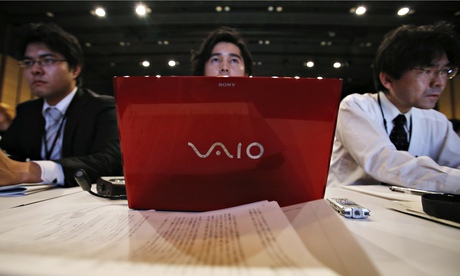
Sony's decision to exit the PC business means that after 17 years in the industry, the Vaio brand will probably disappear from western retailers before the end of 2014.
The decision highlights a problem that has begun to afflict smaller makers of Windows PCs, and even some of the big ones: as the global market for PCs shrinks, profits are fast turning into losses.
Ranjit Atwal, devices analyst at research firm Gartner, says there is a shakeout coming. The PC market is dominated by five big companies – China's Lenovo, the American HP and Dell firms, and Taiwan's Acer and Asus. Together they ship 60% of the PCs sold globally a year. Apple has just over 5% of the market. That leaves about a third of the market for the smaller players, and far less of the profits.
As the PC market has contracted over the past two years, from a peak of 361m in 2011 to 315m last year, it has become harder for smaller players to make a profit. Calculations based on financial results suggest that the average selling price of a PC made by the "big five" fell from $614 at the start of 2010 to $544 (£332) in the autumn of 2013.
Profits per PC for those big five companies, though, have dropped from $15.71, or 2.6% of the selling price, to $14.87. That is not evenly spread: Asus is the most profitable, while Acer reportedly has made an operating loss for the past three quarters.
And those five are the companies that build at real scale, shipping between 5m and 15m units every quarter.
Atwal ranks Toshiba, Samsung, Sony, and Fujitsu as the "bottom four" – together they had about 12% of the market last year – and as those most under pressure.
"They've lost market share, and the market they're in has shrunk as well. Scale is everything in this market. If you haven't got economies of scale then the underlying costs of getting to market, retail and so on, is too great to be profitable," he said.
Sony is instead turning to smartphones and tablets, which are growing, unlike the PC business. But even there the challenges are not small. Together, Apple and Samsung dominate both segments, and many other players are struggling to turn a profit.
"Sony will not be the last to say goodbye to PC hardware," says Ben Bajarin, an analyst with Creative Strategies, in California. "Those who survive will reap the rewards."
Ironically, it is Apple, once the black sheep of the personal computer industry, which is now reaping those rewards. Despite its comparatively small share of the market, its machines are reckoned to collect the lion's share of the profits. Although Apple doesn't specify its PC profits, Horace Dediu, of the Asymco consultancy, believes the company maintains an operating profit of over 18%. On PCs selling at an average price of $1,230, that is $232 – more than 10 times that achieved by any other PC vendor.

